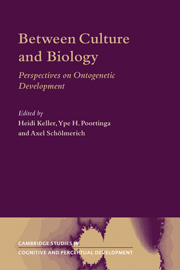Book contents
- Frontmatter
- Contents
- List of figures
- List of tables
- Notes on contributors
- Acknowledgements
- Introduction
- Part I Setting the scene
- Part II Perspectives on development informed by culture
- Part III Perspectives on development drawing from the universal and the specific
- Part IV Perspectives on development informed by evolutionary thinking
- 10 Development as the interface between biology and culture: a conceptualization of early ontogenetic experiences
- 11 Integrating evolution, culture and developmental psychology: explaining caregiver–infant proximity and responsiveness in central Africa and the USA
- 12 Shame across cultures: the evolution, ontogeny and function of a ‘moral emotion’
- Part V Metaperspectives
- Author index
- Subject index
- Cambridge Cultural Social Studies
11 - Integrating evolution, culture and developmental psychology: explaining caregiver–infant proximity and responsiveness in central Africa and the USA
Published online by Cambridge University Press: 22 September 2009
- Frontmatter
- Contents
- List of figures
- List of tables
- Notes on contributors
- Acknowledgements
- Introduction
- Part I Setting the scene
- Part II Perspectives on development informed by culture
- Part III Perspectives on development drawing from the universal and the specific
- Part IV Perspectives on development informed by evolutionary thinking
- 10 Development as the interface between biology and culture: a conceptualization of early ontogenetic experiences
- 11 Integrating evolution, culture and developmental psychology: explaining caregiver–infant proximity and responsiveness in central Africa and the USA
- 12 Shame across cultures: the evolution, ontogeny and function of a ‘moral emotion’
- Part V Metaperspectives
- Author index
- Subject index
- Cambridge Cultural Social Studies
Summary
This chapter describes three neo-evolutionary or neo-Darwinian approaches and their implications for developmental psychology. Many developmental psychologists view ‘evolutionary’ perspectives as ‘hard-wired’, ‘biological’ or ‘genetic’ explanations of human development largely because so much public and scholarly attention has been given to one of these neo-evolutionary approaches – evolutionary psychology. Cover stories about evolutionary psychology have appeared in Time and News week, and evolutionary psychology courses now exist at several major universities. Although evolutionary psychology is described in this chapter, emphasis is given to two lesser-known approaches to neo-evolutionary thought – evolutionary ecology and evolutionary cultural anthropology. Particular emphasis is placed upon the position and role of culture within neo-Darwinian thought. Few developmentalists are aware that the culture concept (i.e. culture as symbolic, historical, transmitted non-genetically generation to generation) exists within an evolutionary framework. Recent research on caregiver–infant proximity and responsiveness among Aka foragers, Ngandu farmers and urban industrialists from Washington DC are utilized to illustrate the neo-evolutionary approaches.
Evolutionary approaches
There are many brands of evolutionary thought within psychology, ecology and anthropology, but the neo-evolutionary or neo-Darwinian approaches described in this chapter emphasize relatively recent contributions to Darwin's theories of natural and sexual selection.
- Type
- Chapter
- Information
- Between Culture and BiologyPerspectives on Ontogenetic Development, pp. 241 - 269Publisher: Cambridge University PressPrint publication year: 2002
- 37
- Cited by



